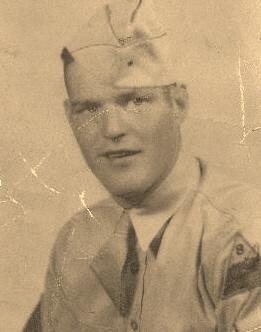
On 31 July 2009, Alverie “Al” G. Paradis died. He was a courageous war veteran, and a loved resident of Hopkinton. Al was born (1920) and raised in Fort Kent, Maine. He also lived in New Hampshire and near Hartford, Connecticut before joining the Army in 1938, as an 18-year old.
This was Al’s first hitch; he felt he was doing something important. Al knew Hitler was a threat, and the country had to be defended. The infantry was Al’s specialty. Training in Maine, at Fort Williams and at Fort McKinley, preceded duty in the Panama Canal Zone as a member of the 5th Infantry Regiment. He remained stationed in Panama until his honorable discharge in November 1941.
After returning to the states, for a short while Al was a Civil Service employee at the Philadelphia Signal Depot where he learned to repair radios and TVs. Early in 1942 – soon after the attack on Pearl Harbor – Al re-joined the Army and was proud to be able to use the original serial number from his first enlistment. He quickly advanced to Platoon Staff Sergeant.
In the 8th Armored Division, which controlled Al’s infantry battalion, he was promoted to Tech Sergeant. The 8th trained at Camp Polk, Louisiana, where he dedicated himself to teach recruits how to do things correctly, and to survive in battle. This resulted in his nick-name “Barking Bulldog.” Al was a machine gun specialist. His family warmly remembers Al telling how he logged-in 1000 hours in a M3A1 Halftrack.
This photo shows a young Sergeant Paradis wearing the shoulder patch of the 8th Armored Division.
From a staging area at Camp Kilmer, New Jersey, Al’s unit deployed to England at the end of 1944. “Tornado” was the Division combat code name, and they were also called “The Thundering Herd,” and “Iron Snake.” In January 1945, a troop position was taken in France to repel a German attack that never materialized. Instead, the unit supported the 94th Infantry Division during the last days of the Battle of the Bulge. Later they moved to an area near Maastricht, Holland, to prepare for the 9th Army’s attack toward the Rhine River. Al’s Charlie Company took a defensive position along the west bank of the Roer River just east of St. Odilienberg.
While occupying this position, the company was under periodic shelling. Early on the morning of 23 February 1945, men of Al’s company were able to hear and see the greatest aerial and artillery bombardment of the war.
From this position in Holland, night patrols regularly probed into Germany. Starting on 26 February 1945, 14-man combat patrols crossed the river and checked enemy installations and river crossings. On the night of the 27th an 11-man patrol from the third platoon was dispatched. The terrain was heavily mined and booby trapped. This is when Al rolled on an anti-personnel German Schu mine while crawling forward, and was seriously wounded. There are several spelling variations of the Schu mine such as S-mine, or Shoe Box mine. It was in a wooden box about 6 inches to a side, and believed to be similar in charge to the Bouncing Betty. Al was hospitalized in Paris before returning home. He was discharged for the second time in November 1945.
Al Paradis’ unselfish contribution and sacrifice to the USA war effort earned many decorations including the Purple Heart and the Bronze Star for Valor.
When he returned to civilian life, Al continued to be generous with his time. He is remembered for his radio and TV repair business, and many community activities. He was a Selectman, he participated in research for the Boston Arm Project, and he was a religious education instructor at St. John the Evangelist Church. Much of what he did seemed to be with fellow veterans: founder and coach of Hopkinton Pop Warner Football with Bob Lavoie; Little League supervision including president with Paul Phipps; and, Boy Scout master and district commissioner with Pat Lynch.
There was one veteran who received most of Al’s attention. While a patient at Cushing Hospital, then a part of the VA system, he was cared-for by a pretty nurse who caused Al to say to the man in the next bed, “I’m going to marry her.” He did. Rita Heaton Paradis was Al’s wife for 59 years. They were a loving couple with a wonderful family.
by Hank Allesio















